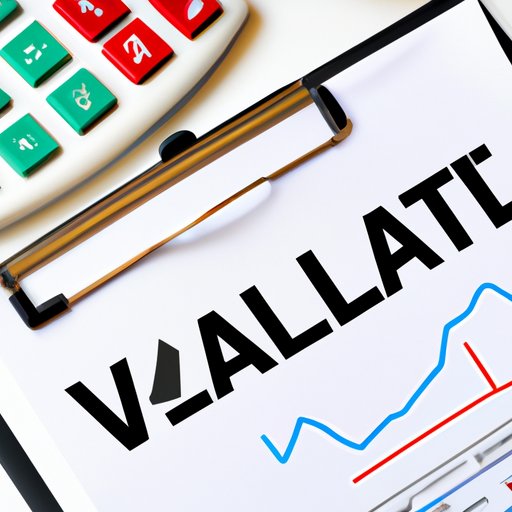
I. Introduction
Business valuation is an essential process for any business owner, and it involves determining the economic value of your company. Whether it is for tax reasons, potential mergers and acquisitions, or simply to gain a better understanding of your company’s worth, business valuation should not be overlooked. In this guide, we’ll explore the key components of business valuation and share tips for accurately calculating your business’s worth.
II. The Basics of Business Valuation: A Step-by-Step Guide
Before embarking on the business valuation process, it is essential to define its purpose. This may include determining a sale price, assessing financing options, estate planning, or measuring the company’s financial performance. Once your purpose for the valuation has been defined, the next step is to assess the company’s financial and operational health. This involves gathering financial statements such as balance sheets, income statements, and cash flow statements. Additionally, it’s necessary to identify all tangible and intangible assets that contribute to your business’s value, such as intellectual property and brand recognition. You may also want to consider market trends and future growth potential.
III. Valuing Your Business: Understanding the Key Methods
There are three primary approaches to valuing a business: asset-based, market-based, and income-based. The asset-based method is based on a company’s assets and liabilities. In contrast, the market-based approach considers the current market value of similar companies that have recently undergone a sale. Finally, the income-based method considers a company’s earning potential over the long run and is divided into two subcategories; discounted cash flow analysis and capitalization of earnings. Each method has advantages and disadvantages, and the choice of approach can vary depending on the company’s size, industry, and specific circumstances.
IV. Demystifying the Process of Business Valuation
There are several common misconceptions about business valuations, particularly that it is a straightforward process that always leads to accurate results. However, this is not always the case. Additional challenges can arise during the valuation process. For example, unique intangible assets can be tough to value, and the valuation process can be time-intensive and costly. To ensure a successful valuation process, be sure to hire professionals with expertise specific to your industry, take the time to identify all assets, and foster clear communication between all stakeholders.
V. 5 Common Business Valuation Approaches Explained
In addition to the three primary approaches, there are other common methods of business valuation, including the cost-to-create method, the liquidation method, and the excess earning method. The cost-to-create method considers the cost of starting a similar business from the ground up, while the liquidation approach looks at the potential value if a company were to be quickly sold or shut down. Additionally, the excess earning method takes an in-depth look at the company’s past financial statements and future earning potential to determine its true value. Each approach has its own pros and cons, so it’s essential to consider which method is most appropriate for your situation.
VI. Determining Your Company’s Worth: The Importance of Business Valuation
Knowing the true value of your company is essential, and business valuation can help you make important strategic decisions. For example, if you’re considering a merger or acquisition, it’s vital to gain an understanding of your company’s worth in comparison to others in the market. Additionally, it can help you determine the best financing options and develop a more accurate estate plan. Furthermore, business valuation can help you identify areas of your business that are underperforming and take corrective action to improve your overall performance.
VII. Maximizing Your Business’s Value: Tips for Accurately Calculating Its Worth
One essential tip for accurately calculating your business’s value is to stay up-to-date with your company’s financial and operational performance. Conduct a regular valuation and compare your results with those of your competitors. You should also work with accounting professionals and financial advisors to ensure that your valuation is accurate and sound. Finally, leverage available resources and tools that are specifically designed for the valuation process.
VIII. Conclusion
Business valuation is a critical process that can significantly affect your company’s success. Understanding the basics of valuation and the critical steps involved is essential for any business owner. Take the time to clarify your purpose for valuation, assess your company’s financial and operational health, and choose the best valuation method for your circumstances. Finally, remember that ongoing valuation is critical to monitor changes in your business’s performance and maintain your company’s economic value.





